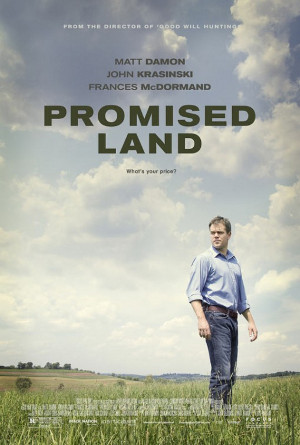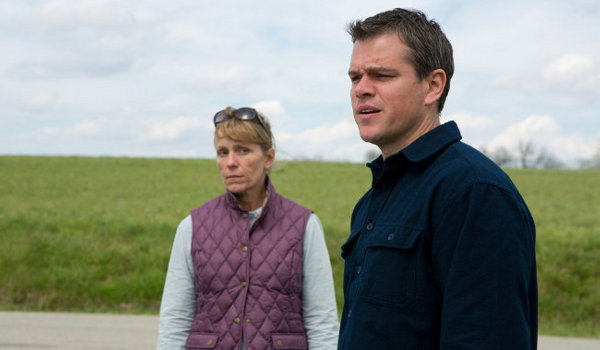- Title: Promised Land
- IMDB: link

 How far will you go for your job even when you know what you are doing is wrong? That’s the question at the center of director Gus Van Sant‘s Promised Land. Matt Damon (who co-wrote the screenplay with costar John Krasinski) stars as Steve Bulter, a rising star for a natural gas company sent in to a small town with his partner (Frances McDormand) to get his company an initial foothold in the state.
How far will you go for your job even when you know what you are doing is wrong? That’s the question at the center of director Gus Van Sant‘s Promised Land. Matt Damon (who co-wrote the screenplay with costar John Krasinski) stars as Steve Bulter, a rising star for a natural gas company sent in to a small town with his partner (Frances McDormand) to get his company an initial foothold in the state.
Butler is a closer, known for his ability to use his own small town upbringing to close communities far faster than anyone else. His last trip in the field before his big promotion leads him to a small town hit by hard economic times looking for just the kind of relief his company can offer.
What starts out as a simple sale is complicated by a variety of factors including a local science teacher (Hal Holbrook) against the dangers of natural gas, a possible love interest (Rosemarie DeWitt), and the arrival of a do-gooder (Krasinski) who scares off potential buyers with horror stories of how fracking has destroyed similar farming towns.
Damon and Krasinski provide a solid set-up as Butler’s latest sure-win begins to slowly slip through his fingers. In the process of trying to win over natural gas’ detractors we learn just how far Butler (and his company) will go to get the sale. It’s a this point things start to get a little shaky.
Of all the possible choices for the plotline of Promised Land to go it chooses the safest and takes the hardest decision of Butler’s life out of his hands with a late twist which feels rather superfluous. The end of the film certainly doesn’t ruin the movie, but it does force Promised Land out with a whimper rather than a bang in its all-too-obvious climax.
Damon and McDormand are great together and I would have enjoyed more of their banter. Even if it is a little too cute, I enjoyed McDormand’s romantic subplot with a local store owner (Titus Welliver). Damon and Dewitt don’t have quite the same chemistry, or are really given enough screentime to let it develop, but they work well together. Damon’s co-writer, meanwhile, saddles himself with the film’s least interesting role of the one-note protagonist who feels at times more like a caricature of an environmentalist than someone devoting his life to an ideal.

The script isn’t as evenhanded on the subject of fracking and natural gas as it would like to believe, while being more simplistic on a complex issue than it needs to be, but certainly doesn’t push one perspective down the audience’s throat. In fact everything about the film (at least up until its big twist) feels very natural and well thought-out. But when you get down to it, the subject matter is far less important to our screenwriters than the hard decision Damon’s character is forced to make that has nothing to do with his own knowledge or beliefs about the process of fracking.
Promised Land is a good film that could, and probably should, be better than it is. Damon carries the movie and the rest of the supporting cast are well-cast (even if they aren’t always given much to do). Although far from perfect, it’s a solid film that introduces some important arguments about natural gas you’re unlikely to see in any other mainstream film this (or nearly any other) year. In the end, however, Promised Land is far more concerned with what kind of man Steve Butler is than the larger safety issues of fracking for natural gas.
